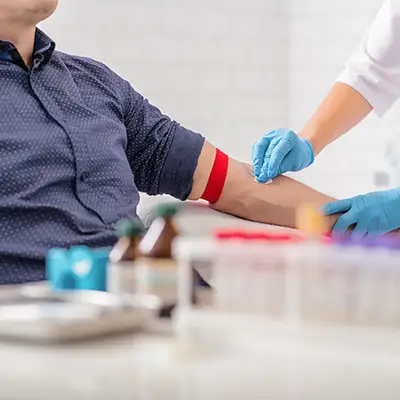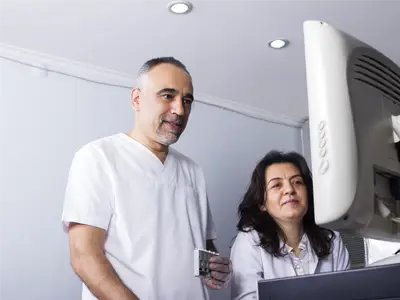Professional Development
Home / Professional Development / Healthcare / Phlebotomy Technician
Phlebotomy Technician
What does a Phlebotomy Technician do?
A phlebotomy technician is a professional who is trained to collect blood samples. Other tasks have begun to fall under their purview including collecting throat cultures and urine specimens (non-blood samples).
Blood and non-blood specimens are collected for testing so they can be analyzed in a lab to diagnose illness, evaluate the effectiveness of medications, determine whether a patient is receiving proper nutrition and more.
Where Can You Work?
Phlebotomy technicians most often work in hospitals and outpatient labs, but can also work in physician’s offices, student health centers, correctional facilities, plasma centers, blood banks or other health care facilities.
Length
12 Weeks
Requirements
- High School Diploma or GED
- Web browser with internet connection
- Course registration & payment
Training Materials Provided
- Expert-led video based training
- eBook: Phlebotomy Worktext and Procedures Manual
- Competency assessments
- National Certification exam fee
Cost
$2,000
Clinical Requirement
A clinical component is required for this program. We will assist students enrolled in this program find a clinical location. If you have any questions about the clinical requirements of this program, please discuss them with your Training Specialist.
Phlebotomy Technician
Healthcare employment is projected to grow by 13% from 2021 to 2031, according to the Bureau of Labor Statistics. This means that over the next decade there will be nearly 2 million new positions available for those interested in healthcare.
Upon completion of this certified phlebotomy technician program you’ll learn a number of skills, such as:
- Knowing medical terminology, disease processes, anatomy and physiology
- Understanding the responsibilities of patient care and monitoring, safety and compliance
- Grasping the importance of customer service, communication skills and professionalism
- Collecting blood and non-blood specimens for testing and analyzing in a clinical laboratory
- Effectively communicating with patients, doctors and medical staff efficiently and understand the importance of bedside manner
- Verifying patients’ identity to ensure proper labeling of specimens and entry of information into a database
- Assembling and maintaining equipment such as needles and specimen containers
- Keeping a clean, sanitary and safe work environment
- Appreciating the role of HIPAA, OSHA, COLA and CLIA-waived testing
Courses - 12 Weeks
- Professionalism in Allied Health
- Introduction to Human Anatomy and Medical Terminology
- Phlebotomy
Program Preview
Phlebotomy Technician Job Possibilities

Phlebotomy Technician
$35,000 – $37,000
ESTIMATED SALARY

Laboratory Specimen Processor
$22,000 – $36,000
ESTIMATED SALARY

Laboratory Assistant
$26,000 – $49,000
ESTIMATED SALARY
Certification Information
After completion of our Phlebotomy training program, you will have the knowledge to pass the Certified Phlebotomy Technician (CPT) exam, issued through the National Healthcareer Association (NHA), and begin your career in healthcare.
Upon completion of this program, students wishing to complete the Certified Phlebotomy Technician exam will be required to complete 30 venipunctures and 10 capillary sticks on a live person. Students should already be working in the field to complete this requirement.
Certified Phlebotomy Technician
The CPT exam ensures you are knowledgable and fully prepared to work as a phlebotomy technician in a clinical environment.
Issuing Authority

Payment Options
Pay in full using any major credit card, PayPal, or Venmo. Select “credit card” as your payment option.
![]()


Apply for PayPal Credit and pay zero interest if your balance is paid in full within 6-months. Complete a quick application and you’ll receive a credit decision within seconds.


Program Comparison
|
|
Emerge Education
|
Community College
|
|---|---|---|
|
Program & Tuition Cost
|
$4,000 average
|
Up to $20,000
|
|
Exam Fees, Books & Materials
|
Included
|
Up to $750
|
|
Job Ready In
|
3–6 months
|
24–48 months
|
|
Schedule Flexibility
|
On-demand 24/7
|
Set class schedule
|
|
Travel Requirements
|
None: 100% online
|
On-campus classrooms
|
|
Student Support
|
Personal Advisors: text, call and email access
|
Professors: scheduled office hours
|
|
Career Coaching
|
Exam-tailor + soft-skill training to build well-rounded careers
|
Exam-based + prerequisites and electives to meet credit
|
|
Content Delivery
|
3D animations, immersive environments, interactive activities, game-based learning
|
Professor lectures
|
Meet Your Training Specialist
Lauren Holubec is your Training Specialist. She is here to help you understand the program, payment options and succeed! Get in touch with Lauren to learn more about the program and how to achieve your career goals. If you are a manager interested in group enrollment, please contact Lauren directly so she can assist you with the enrollment process.

FAQ
A phlebotomy technician needs a number of skills to be successful. They need to have coordination, because it takes a steady hand and good eye-hand coordination to draw blood while causing as little pain to the patient as possible. They need to have attention to detail, because everything needs to be properly labeled and stored to avoid mixing, lost or contaminated samples. Also, communication and stamina are important skills to possess, because you’ll be working for hours on your feet with patients who may be nervous around needles.
The number of hours a phlebotomist works depends on the work location. In a clinic or donation center, you might work a fairly normal weekday full-time schedule. In a hospital you may be required to work night shifts and weekends. Phlebotomy technicians typically work 40 hours a week, but may work overtime hours in clinical and hospital environments.
The best place to work as a phlebotomy technician will depend on your desired workplace environment. Some phlebotomists may enjoy the challenges of a hospital or clinic environment, whereas others might prefer more predictable office hours like in a doctor’s office.
Medical assistants work alongside physicians to provide both administrative and clinical support. A phlebotomy technician is solely trained to draw blood.
Yes. For most phlebotomy professional certifications, you need to earn a certain number of continuing education credits every two years. There are short courses you can take to fulfill this requirement.
